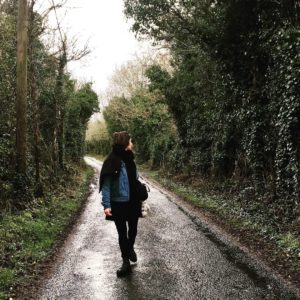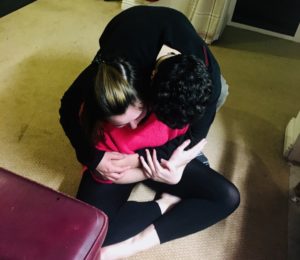Wherever You Go, There You Are: Mental Health Issues Abroad



“Wherever you go, there you are.” As someone with a host of mental health issues resulting from a past I’d do anything to forget, these words have always been a reminder that no matter how far I travel, I’ll never be able to escape myself and my history. But as I reflect on the challenges and triumphs of my first month abroad, they have begun to take on a different meaning. My mental health issues, my story, and my many flaws have accompanied me to Ireland, but I am realizing that the resilience I gained from years of struggle arrived with me as well.
The adaptations, evolutions and transformations that occurred while I recovered from mental illness shared an equal but unappreciated place in my personal baggage. Alongside everything I’d like to leave behind is everything that got me to this amazing place; a place where I’m participating in adventures, meeting people and having experiences that until recently I didn’t allow myself to even dream of. Here I am, in Ireland, and I find myself surprisingly equipped to deal with a life abroad.
Being Here
I came into this adventure knowing it wouldn’t be all discovery and inspiration. As an adult student with lots of responsibilities and several part-time jobs, I knew that suddenly having a much quieter, simpler life while I was abroad would be difficult. I was prepared for a lot of emotions that had been stuffed away in my busy life to resurface. I was prepared for discomfort, fear and pain; and in theory, I welcomed the growth that would follow these challenges. What I wasn’t prepared for is how easy it is to lose yourself when the responsibilities and roles that define your everyday are removed.
I’ve always thought the promise of reinventing yourself in a new place was one of the most attractive aspects of studying abroad. Yet what I’ve found is that in reinventing, in editing out all the things about my life that I wanted to escape, I was also leaving out the triumphs associated with those experiences. In disowning myself, I was disowning the person most responsible for giving me this gift of studying in another country.
So one night, aided by some kind locals, my new friends, a jarring tarot card reading and some Irish thrain, I decided that if I wanted to experience Ireland 100%, I had to be there with all of the parts of myself I’d been denying.

Revelations like these don’t mean life suddenly becomes all unicorns and rainbows (although that’s a normal landscape in Ireland). I still have nightmares, still overreact to things others don’t notice, still catch myself holding on to perfectionism and impossible expectations. But when I’m not spending my time avoiding these uninvited experiences, I’m able to greet them with my strengths. Even better, this grudging self-acceptance has fostered incredible conversations with my community here in Ireland. I’m forging stronger, more honest connections, creating more authentic art, slowly allowing others to know me, and in turn being granted the gift of knowing them. This rapport led to one of my peers offering to write about her experiences with mental health issues while abroad.
Megan’s Story: A Stranger in a Strange Land
Megan Channell is a kind, soft-spoken Canadian post-graduate student at the Burren College of Art. Like me, she addressed the allure of reinventing herself abroad. “I was conditioned to believe that my sweet Vancouver Island was at odds with any personal transformation I could hope to achieve. I think I still do believe this to some degree. Home is at its base level comfort and comfort inhibits growth. Personal change is difficult to achieve when you are surrounded by people who know all of your idiosyncrasies. It is far easier to board a plane and start again in the presence of strangers; to be, like the title of Robert Heinlein’s sci fi classic, a stranger in a strange land.”

After several months, Megan is the first to describe the mental health benefits of her experience abroad: “Two major attributes of studying abroad are opportunities for deep reflection and defamiliarization. There is enough physical distance between you and your troubles back home to allow for the mental distance required to gain a new perspective.”
However, Megan is also transparent about the difficulties she has encountered. Her first term was full of challenges as reality confronted her expectations about how international living “should be” helping her depression and anxiety. “During the first term, I put a lot of unwarranted pressure on myself because I viewed this year as a once-in-a-lifetime opportunity. This term, I have been focusing my energy towards gratitude for being here and … understanding that I am doing the best that I can. Being away has by no means been the solution to my mental health issues; there is no solution, it is a gradual process that takes work.” Aided by this acceptance, Megan says she’s feeling better than she has in years, much of which she credits to the support of her community abroad.
Mental Health Accommodations: Not a Weakness

Even if it feels otherwise, being a student who requires special accommodations for mental health issues is not a weakness. While mental illness is painful and often fraught with isolation, shame and suffering, I have found that the process of overcoming adversity has actually helped to prepare myself and many of my peers for the difficulties of living abroad. What are seen as limitations can actually be strengths.
Everyone experiences symptoms of mental illness and recovery differently. IFSA offers excellent mental health resources and there are also support systems available in many international university communities. I received enormous assistance through the advisors and mentors I worked with at IFSA, and despite the remoteness of the art college, a counselor comes to see students every week. If you are a student who struggles with mental health issues, I hope this article serves as evidence that you are far from alone, and given support, you will find healing both in your community and the person you are at home and abroad.
Laura Kennedy is an Art Therapy major at Avila University and studied abroad with IFSA at the Burren College of Art in Ireland in Spring 2019. She is an International Correspondent for IFSA through the Work-to-Study Program.